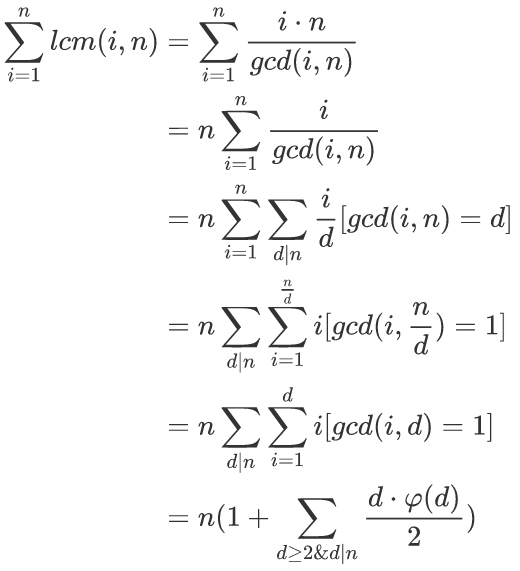bzoj2226 [Spoj 5971] LCMSum
2226: [Spoj 5971] LCMSum
Time Limit: 20 Sec Memory Limit: 259 MBSubmit: 1943 Solved: 849
[Submit][Status][Discuss]
Description
Given n, calculate the sum LCM(1,n) + LCM(2,n) + .. + LCM(n,n), where LCM(i,n) denotes the Least Common Multiple of the integers i and n.
Input
The first line contains T the number of test cases. Each of the next T lines contain an integer n.
Output
Output T lines, one for each test case, containing the required sum.
Sample Input
3
1
2
5
1
2
5
Sample Output
1
4
55
4
55
HINT
1 <= T <= 300000
1 <= n <= 1000000
分析:个人感觉比较难的一道数学题.借自GXZlegend的一张图:

第一步转化是很显然的,gcd和lcm之间的关系嘛.
第二步是把n提出来,便于计算.
第三步为了能够对式子进行莫比乌斯反演,强行写成了两个Σ.
第四步就是关键了.在莫比乌斯反演中,gcd(x,y) == k一般都要转换成gcd(x',y') == 1. 那么gcd(i,n) == d就变成:gcd(i / d,n / d) == 1.这个i / d和外面的i / d是一样的,那么可以用i表示它们,即i的意义变成了原来的i是d的多少倍. 这时i的取值范围就和n / d有关了,所以先枚举d,然后枚举i.
第五步利用了因数是成对出现的这一条性质,这样转化便于使用欧拉函数快速求解.
第六步就是欧拉函数啦. 为什么前面有一个1呢?当d = 1时式子不一定成立,必须要特判. 后面的是一个公式:<i并且与i互质的数的和为i * phi(i) / 2. 证明的话比较简单,如果j与i互质,那么i - j也与i互质,这样就会有phi(i) / 2对数,它们都与i互质,并且它们的和为i.
这道题还是挺难想到底的. 首先看到lcm要想到用gcd来转化. 看到gcd要想到用莫比乌斯反演. 如果用莫比乌斯反演肯定会出现2个Σ. 对gcd = k进行转化. 为了满足枚举的上下界,调换枚举顺序. 最后利用因数的成对性整体换元,套用公式即可得到答案.
#include <cstdio> #include <cstring> #include <iostream> #include <algorithm> using namespace std; typedef long long ll; ll T,n,tot,prime[1000010],vis[1000010],phi[1000010],f[1000010]; void init() { for (ll i = 2; i <= 1000000; i++) { if (!vis[i]) { prime[++tot] = i; phi[i] = i - 1; } for (ll j = 1; j <= tot; j++) { ll t = prime[j] * i; if (t > 1000010) break; vis[t] = 1; if (i % prime[j] == 0) { phi[t] = phi[i] * prime[j]; break; } phi[t] = phi[i] * (prime[j] - 1); } } for (ll i = 2; i <= 1000000; i++) for (ll j = i; j <= 1000000; j += i) f[j] += i * phi[i] / 2; } int main() { init(); scanf("%lld",&T); while (T--) { ll n; scanf("%lld",&n); printf("%lld\n",(f[n] + 1) * n); } return 0; }



 浙公网安备 33010602011771号
浙公网安备 33010602011771号